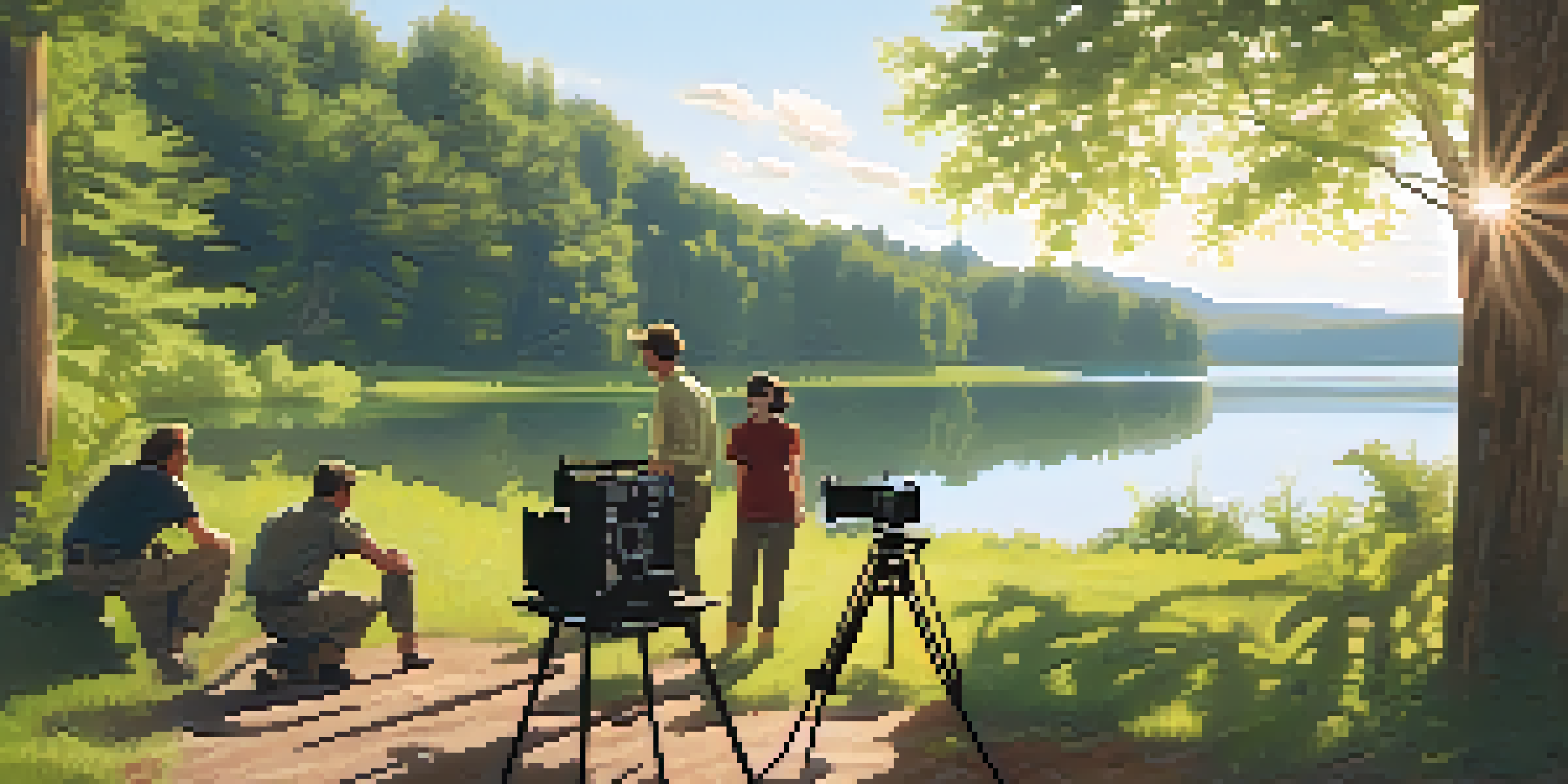Understanding Pre-Production: The First Step in Filmmaking

What is Pre-Production and Why is it Important?
Pre-production is the stage in filmmaking where all planning occurs before cameras start rolling. It's like laying the groundwork for a house; without a solid foundation, everything built on top could crumble. This phase is crucial because it sets the tone, budget, and timeline for the entire project.
If you fail to plan, you are planning to fail!
During pre-production, filmmakers develop the script, scout locations, and assemble their cast and crew. This thorough planning helps anticipate potential challenges, ensuring a smoother shooting process later on. Think of it as a roadmap that guides the production team through the often chaotic filming days.
By investing time in pre-production, filmmakers can save money and avoid delays down the line. Just as a chef prepares ingredients before cooking, a filmmaker who diligently plans can focus on bringing their vision to life without unnecessary distractions.
Developing the Script: The Heart of Your Film
The script is the backbone of any film, dictating the story, dialogue, and character arcs. During pre-production, writers may engage in multiple revisions to ensure the script is polished and ready for production. This process can be akin to sculpting; the more refined the material, the clearer the final shape will be.

Collaboration plays a key role here, as directors, producers, and writers often discuss the script's vision and feasibility. This teamwork helps align everyone's expectations and ensures that the story can be effectively realized on screen. After all, a great script is only as good as the team that brings it to life.
Pre-Production Sets the Stage
This stage involves essential planning that lays the groundwork for a successful film project, including script development, budgeting, and scheduling.
Additionally, focusing on character development during this phase can enhance audience engagement. A well-rounded character can resonate with viewers, transforming a simple narrative into a compelling journey.
Budgeting: The Financial Blueprint of Your Film
Budgeting is a critical aspect of pre-production, determining how resources will be allocated throughout the project. It involves estimating costs for everything from cast salaries to location fees and equipment rentals. Think of it as a financial puzzle; each piece must fit together to create a complete picture.
Good planning without good working is nothing.
A well-structured budget can help prevent overspending and keep the production on track. Filmmakers often use spreadsheets or budgeting software to track expenses and adjust as necessary. Just like a household budget, keeping an eye on the finances ensures everything runs smoothly.
Moreover, a clear budget allows for more informed decision-making when it comes to hiring talent and securing locations. With a solid financial plan in hand, filmmakers can focus on creativity without the stress of financial uncertainty looming over them.
Casting: Choosing the Right Actors for Your Story
Casting is a vital part of pre-production that can make or break a film. Finding the right actors who can embody the characters is essential for bringing the script to life. It's similar to assembling a sports team; each player must fit their role to create a winning combination.
During this phase, filmmakers often hold auditions and consider various factors such as acting skills, chemistry with other cast members, and their ability to connect with the audience. This careful selection process ensures that the performances will resonate with viewers, adding depth to the story.
Collaboration is Key in Filmmaking
Effective teamwork among writers, directors, and producers ensures that everyone shares a unified vision, enhancing the film's overall quality.
Additionally, the casting process can involve negotiations regarding contracts and availability. Establishing a strong cast early on helps solidify the project's direction and inspires confidence among the crew.
Location Scouting: Finding the Perfect Backdrop
Location scouting is crucial for visual storytelling, as the right setting can enhance the film's mood and atmosphere. Filmmakers often explore various sites, considering factors like accessibility, aesthetics, and cost. It's much like choosing the perfect canvas for a painting; the surroundings can elevate the artwork significantly.
During pre-production, the production designer and location manager often collaborate to ensure that the chosen locations align with the film's vision. They assess the practicality of shooting in each location, considering elements like lighting, sound, and logistics. This groundwork helps avoid potential hiccups during filming.
Moreover, securing permits and permissions to shoot in specific locations is a must. This process can be time-consuming, but it's essential for a smooth production experience, allowing filmmakers to focus on capturing their story without legal distractions.
Creating a Production Schedule: Mapping Out the Days
A production schedule outlines the timeline for filming, helping to keep the crew organized and on track. It serves as a detailed itinerary that breaks down shooting days, locations, and scenes. Think of it as an elaborate calendar that guides everyone through the chaotic world of filmmaking.
During pre-production, the assistant director usually takes the lead in developing this schedule, coordinating between departments to ensure everyone is on the same page. This collaboration helps identify potential conflicts and allows for adjustments before production begins. An effective schedule can significantly reduce stress during the shooting phase.
Final Reviews Ensure Smooth Shooting
Conducting final checks and test runs before production helps filmmakers identify potential issues, allowing for adjustments that lead to a more confident filming process.
Moreover, having a clear production schedule helps manage the cast and crew's time effectively. When everyone knows where they need to be and when, it fosters a more efficient working environment, ultimately allowing for a higher quality final product.
Pre-Production Meetings: Aligning the Team's Vision
Pre-production meetings are essential for ensuring that everyone involved in the project shares a unified vision. These discussions allow filmmakers to communicate their ideas clearly while addressing any questions or concerns from the cast and crew. It’s similar to a team huddle before a big game, where everyone is on the same page.
During these meetings, directors and producers often share their creative vision, while department heads discuss their specific needs and expectations. This open dialogue fosters collaboration, allowing the team to identify potential challenges and brainstorm solutions together. It’s an opportunity to build trust and camaraderie before diving into the production.

Ultimately, these meetings can make a significant difference in the overall efficiency of the shoot. When everyone is aligned and aware of their roles, it creates a sense of unity that can withstand the pressures of filmmaking.
The Final Steps Before Production: Reviewing and Adjusting
As pre-production comes to a close, filmmakers often conduct final reviews to ensure everything is ready for the shoot. This includes double-checking scripts, confirming locations, and finalizing budgets. It’s akin to a final dress rehearsal before a performance; every detail matters.
During this stage, filmmakers may also conduct test shoots or rehearsals to refine performances and camera angles. These practice runs help identify any potential issues before the actual filming begins, allowing for adjustments to be made ahead of time. The goal is to approach the first day of shooting with confidence.
Finally, a successful pre-production phase sets the stage for a smoother production process. With thorough preparation, filmmakers can focus on what they do best: telling compelling stories that resonate with audiences around the world.